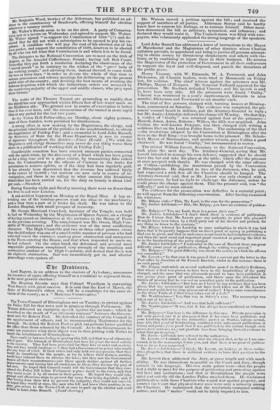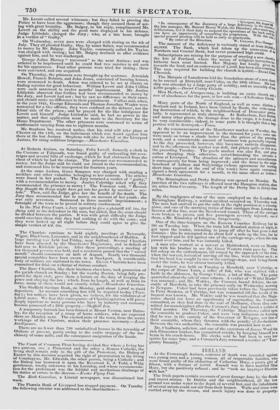Lord John Russell has addressed a letter of instructions to
the Mayor of Manchester and the Magistrates of other districts where Chartist agitation prevails, to apprehend and bring to justice all persons attempt- ing to obtains money by threatening shopkeepers and others with vio- lence, or by combining to injure them ins their business. Ile assures the Magistrates of the protection of Government in all their endeavours to support the loyal and well-disposed, and punish the disturbers of the public peace.
henry Vincent, with W. Edmonds, W. A. Townsend, and John Dickenson, all Chartist leaders, were tried at Monmouth on Friday last, for sedition. The chief witness against the prisoners was Mr. Phillips, Mayor of Newport. Mr. Sergeant Talfourd appeared for the prosecution. Mr. Roebuck defended Vincent ; and his speech is said to have been very able. All the prisoners were found " Guilty." Vincent was sentenced to a year's imprisonment, Edwards to niue months', Dickenson and Townsend to six months' each.
The trial of five persons, charged with burning houses at Birming- ham, commenced on Saturday. The evidence was completed, the pri- soners' counsel heard in defence and the Attorney-General ins reply ; but Mr. Justice Littledale deferred his charge till Monday. On that day, a verdict of " Guilty " was returned against four of the prisoners— Howell, Jones, Aston, Roberts ; Wilkes, the fifth, was acquitted. John Collins, tine well-known Delegate, was then charged with writing a seditious libel on the London Police force. The authorship of the libel —the resolutions adopted by the Convention at Birmingham after the riots in the Bull Ring—was brought home to the prisoner. Mr. Schole- field, Mayor of Birmingham, and another witness, gave Collins a good character. He was found " Guilty," butt recommended to mercy.
The trial of William Lovett, Secretary to tine National Convention, took place the next day. The Attorney-General, seeing that Mr. Lovett intended to manage his own defence, suggested that he should leave the bar and take his place at the table ; which offer the prisoner at once accepted with thanks. He was charged with the same offence as Collins—publishing the resolutions passed by the Convention at 13irmingham. Ile objected to two of the Jurymen, who, he said, had expressed a wish that all tine Chartists should be hanged. The Attorney-General said, that as Mr. Lovett was only charged with a misdemeanour, Inc had no right to challenge the Jurymen, unless he could prove the charge against them. This the prisoner said, was "the difficulty," and he must submit.
Tine evidence for the prosecution was defective in a material point; as will appear from the following conversation. After having examined his witnesses.
Mr. Balguy said—" This, My Lord, is the case for the prosecution." Mn'. Justice .Littledale—" But, Mr. Balguy, you have no evidence of publica- tion."
Mr. Balguy—" Yes, my Lord, there is a prima .facie ease." Air. Justice Littledale—" 1 don't think there is evidence of publication. Bow do I know that Air. Lovett gave any authority to print this.placard ? It might have been taken by a third party out of his drawer and prmted, for any thing we know to the contrary.' Air. Bal:_ruy referred his Lordship to sonic authorities in which it was laid down that it frequently happens that no diivet proof of agency in publishing a libel can be given, and that in such cases resort must be had to indirect evidence, and then the most usual and important prouf consisted ill proving the libel to be in the handwriting of the party charged.
Mr. Justice Littledale—" 1 remember in the ease of Burdett there was great difficulty about proof of publication, though the writing was proved." Mr. Balgity--" The great difficulty was about the courtly inn which the offence was committed."
Mr. Lovett—" In that case it WIls proved that a serve nit put the letter in the Post-office by ffirection of Sir Francis Burdett, whilst in this instance there is no such proof." Mr. Balguy contended, on several authorities quoted in Starkie's Evidence, that where a libel was roved to have been in the handwritieg of the party charged, and the same libel was afterwards proved to have been published, it was prima fitric proof' of publication, and threw upon the defendant the burden of proving that he was not an assenting party to the publication.
Air. Justice littledale." But bow do I know by any evidence that has been given, that the manuscript might not have been taken out of Mr. Lovett's &amr and published by some person out of nnailn'C I have some remembrance in the State Trials of a lihel being taken out of' a Mr. Waddington—" Yes, that was inn Sidney's case. The manuscript was taken out of his desk."
Justice Littledale—" And was that held sufficient:" Air. Waddington—" It was, but it has always been considered an infamous decision."
Air. Itabely—" But here is the difference in this case. Private possession is not only iirfoad, but it is also provi.i1 that it has since been published; and your Lord.liip will tind by the authorities quoted inn Starkie, volume second, page -1:)4, th:it proof of handwriting; combined oith subsequent publication, is strong and 11110,1 pcie proof that It Iva, Inffilishial by the inithor, though such prima tlwie evidence does not preclude Iiiill hunt bringing forwarrl evidence to rebut that prestouptim)."
Mr..lostice Littletlide here referred to the authorities.
Mr. Lovett—" I submit, my Lord, that the alleged lffid, as far as I am con- cerned, is in the 111.11111,4'611i ihfUre, you, and that there is 11(1 proof of publica- tion as far as 1 UM Cl/Ilet•rned."
;:e 1.1ti le.1.11..—" 1 thiek, Mr. Lovett, on !oohing at Blest, autho- rities altogether, that there is sufficient evidence to leave that question to the Jury."
Mr. Lovett then addressed the Jury, at great length and with much l le was throughout respectful to the Court and Jury, though earnest iu his language. His two main points were—that the people had a right to meet for the purpose of petitiiming and protesting against bad laws and institutions; and that at Birmingham the people were quiet told orderly till the London Police attacked them. He disclaimed participation with those Chartists who waged war against property, and assured the Court that physical-force men were only a minority among the Chartists. He maintained that the resolutions contained nothing untrue, and that "malice" could not be fairly imputed to hint.
Mr. Lovett called several 'witnesses; but they failed in proving the Police to have been the aggressors ; though they accused them of act- ing with great brutality. Mr. Balguy, in his reply, complimented Mr. Lovett on the ability and the good taste displayed in his defence. Judge Littledale charged the Jury ; who, at a late hour, brought in a verdict of" Guilty."
On Wednesday, seven men were charged with rioting on the 4th of July. They all pleaded Guilty. One, by name Salter, was recommended to mercy by Mr. Balguy. john Taylor, commonly called Dr. Taylor, was charged with rioting ; but Mr. Balguy declined to offer evidence against him, and he was discharged.
George Julian Harney" traversed" to the next Assizes ; and was ordered to be imprisoned until he could find two sureties in 40/. each for his appearance. Four other persons were tried for rioting ; three were convicted, and one acquitted.
On Thursday, the prisoners were brought up for sentence. Jeremiah Howell, Francis Roberts, and John Jones, convicted of burning houses, were sentenced to death. Aston was ordered to be set at liberty on finding sureties for good behaviour. William Lovett and John Collins were each sentenced to twelve months' imprisonment. Mr. Justice Littledale observed that Collins had been recommended to mercy by the Jury, and Lovett had not ; but he saw no difference in their cases, and should make no difference in their punishment. Collins said, when, in the year 1821, George Edmonds and Thomas Jonathan Wooler were sentenced for a like offence, they were confined on the debtors', not the felons' side of the prison ; and he prayed for the like indulgence for Lovett and himself. Judge Littledale said, he had no power in the matter, and that application must be made to the Secretary for the Home Department. The other prisoners were sentenced to terms of confinement varying from one to eighteen months.
Mr. Stephens has received notice, that his trial will take place at Chester on the 14th, on the indictment which was found against him there at the last Assizes. Stephens will also be tried at the Liverpool Assizes, for using seditious language.—Manchester Guardian.



























 Previous page
Previous page